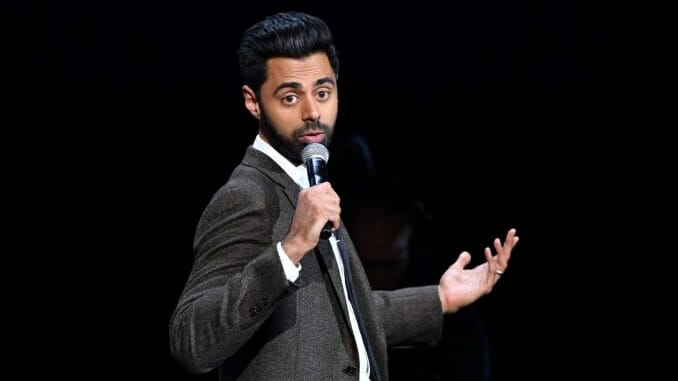The Dangers of Political Comedy: Hasan Minhaj Won’t Die for His Art
Photo courtesy of Getty Images
Hasan Minhaj doesn’t want to be Tupac. No, he says, he’d rather be like Diddy, living to get rich as his more talented peers die around him. It’s a joke, of course, a referential dig at both Diddy and himself that is almost tossed off in the midst of a brilliant, revealing, and uproarious new special. But it’s a weighty thing for an artist to admit, especially one like Minhaj, who has devoted much of his career to joking about and trying to unravel political institutions. And it serves as the crux of his new stand-up special, The King’s Jester, which I caught at a sold-out show in Los Angeles’s Microsoft Theater.
During the special, which will eventually hit Netflix (the home of his now-cancelled show Patriot Act and his first stand-up special, the much-acclaimed Homecoming King), infertility scares, islamophobia, Kumail Nanjiani and Patriot Act legal battles are all fodder for Minhaj’s signature high-wire mix of humor and sincerity. He comments on this tonal balancing act in a particularly interesting meta moment, as he stops in the middle of describing the US’s “reasonable person” standard (I promise, it makes sense in context) to emphasize that he trusts his audience to always understand his intentions.
But the key focuses, the birth of his children and the drug-like mania of attention and sudden fame, are what lead us to that thesis about Tupac. Minhaj takes the audience on a romp through some of his most viral moments—most notably times he went after autocrats on Patriot Act and the Time 100 Gala, in which he went after Jared Kushner’s connections to Saudi Crown Prince Mohammed Bin Salman—and his elation to be trending. Minhaj’s wife Beena, a constant presence in the show as Minhaj seals the deal as comedy’s new chief wife guy, is core to this portion of King’s Jester.
She serves as a foil to the intoxicating nature of this virality, presented as the cool head calling Minhaj out for seeking attention more than actually caring about these issues (he doesn’t deny this). She’s the one bringing it to his attention that going after despots might be playing with fire. And indeed, Saudi Arabia classified the episode of Patriot Act about the killing of Washington Post journalist Jamal Khashoggi to be a criminal act, leading to Netflix infamously pulling the episode off their service in Saudi Arabia.
This conflict, between the attention he received from controversial incidents and familial concern, comes to a head as Minhaj tells the harrowing story of an unexpected threat against his family. Minhaj leans into the sincerity the truth calls for as he describes the fear and trauma of this moment, and the suspicion that he was targeted because of his work on Patriot Act. This leads to a tough conversation with his wife, who says she’ll leave him if he ever puts the family at risk again. Minhaj quickly agrees, deciding he’d focus Patriot Act’s critical eye on domestic issues rather than foreign tyrants.
-

-

-

-

-

-

-

-

-

-

-

-

-

-

-

-

-

-

-

-

-

-

-

-

-

-

-

-

-

-

-

-

-

-

-

-

-

-

-

-








































